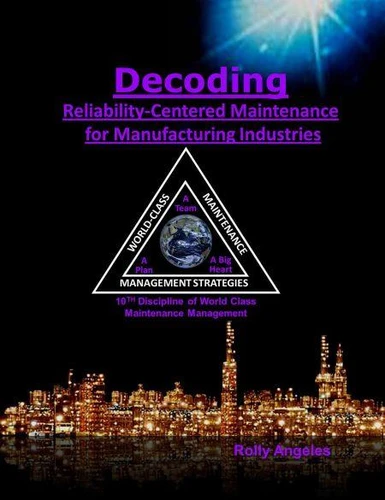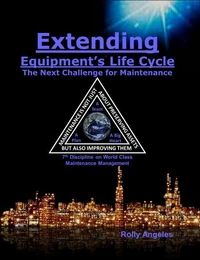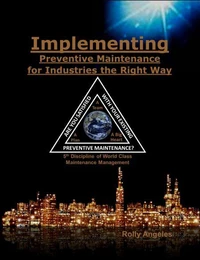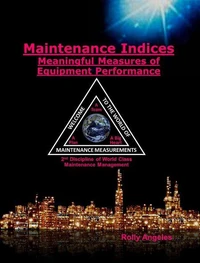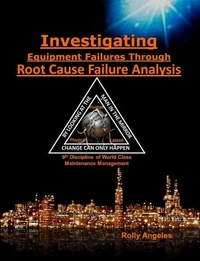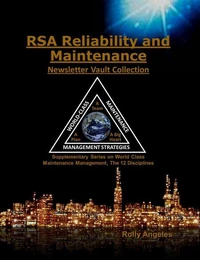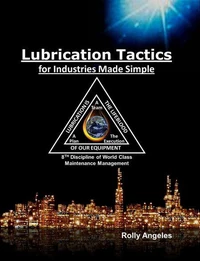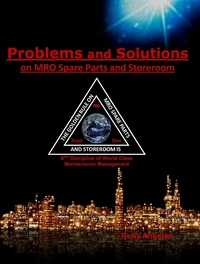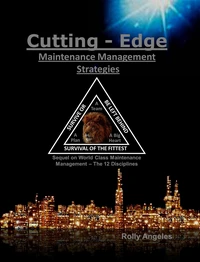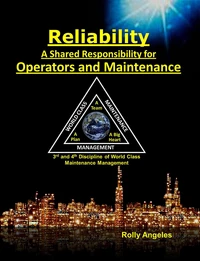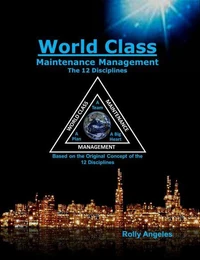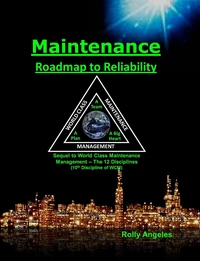Decoding Reliability - Centered Maintenance Process for Manufacturing Industries 10th Discipline of World Class Maintenance Management. 1, #7
Par :Formats :
Disponible dans votre compte client Decitre ou Furet du Nord dès validation de votre commande. Le format ePub est :
- Compatible avec une lecture sur My Vivlio (smartphone, tablette, ordinateur)
- Compatible avec une lecture sur liseuses Vivlio
- Pour les liseuses autres que Vivlio, vous devez utiliser le logiciel Adobe Digital Edition. Non compatible avec la lecture sur les liseuses Kindle, Remarkable et Sony
 , qui est-ce ?
, qui est-ce ?Notre partenaire de plateforme de lecture numérique où vous retrouverez l'ensemble de vos ebooks gratuitement
Pour en savoir plus sur nos ebooks, consultez notre aide en ligne ici
- FormatePub
- ISBN8201146986
- EAN9798201146986
- Date de parution03/07/2021
- Protection num.pas de protection
- Infos supplémentairesepub
- ÉditeurJL
Résumé
There are cases where breakdowns and failures are not the primary cause of equipment downtime, especially in manufacturing industries. Although RCM is a popular maintenance strategy, many manufacturing industries are still not implementing this process and continue to remain stuck in their PM tasks activities. The main reason why I wrote this book is that doing RCM in a manufacturing plant is a bit different from doing RCM in oil and gas, power plants, and other similar plants because their equipment losses are different.
Although the process on how RCM is done will be the same. If you worked in a semiconductor plant, breakdowns and failures are not the main issues on the machines, but minor stoppages, changeover, and quality problems are. You must know the boundary between what RCM can address and what it cannot. RCM will address failures and breakdowns by proposing maintenance tasks; it is not designed to address every possible equipment loss.
What I am saying is that failures are just a subset of the entire equipment losses. Suppose you have chronic quality problems caused by the equipment; RCM can address some of them, but not all, since Quality problems and defects are much broader than breakdown and failures. I have a detailed explanation of what particular losses RCM can and cannot address in Chapter 3.3.2 of this book. This book is written to help and provide detailed guidelines for manufacturing industries on implementing RCM on their machines, equipment, and assets.
Some of the highlights of this book include: - 27 Frequently Asked Questions (FAQ) on RCM- 22 Tips on Implementing RCM- 15 Don'ts About RCM- Why the RCM Preparatory Stage is Important- Detailed Guidelines in Doing the RCM Preparatory Step- Can RCM Address All Equipment Losses?- Actual Case Study on RCM: Air Handling Unit Case- Role of Operators in the RCM Analysis- How to Integrate RCM into the TPM Process- Bonus: RCM Forms I used in Excel Format- The RCM and TPM Crossroads - Do they have different or the same paths- Strengthening the SAE JA1011 Criteria- Addressing MRO Spare Parts after Implementing RCM- How to Determine the Correct Interval for PM, PdM, FFT, and Switching Standby Components- MRO Decision Diagram on Whether to Stock or Not to Stock- Difference Between a Failure Mode and a Root Cause- Secondary Tasks for Doing On-Condition Tasks- Detailed Guidelines in Writing the RCM Decision Worksheet Explained- Detailed Guidelines in Writing the RCM Information Worksheet Explained- Detailed Guidelines in performing Horizontal Replication for Similar Equipment with the Same Operating Context- Detailed Guidelines in Conducting the RCM Audit and many more .
Although the process on how RCM is done will be the same. If you worked in a semiconductor plant, breakdowns and failures are not the main issues on the machines, but minor stoppages, changeover, and quality problems are. You must know the boundary between what RCM can address and what it cannot. RCM will address failures and breakdowns by proposing maintenance tasks; it is not designed to address every possible equipment loss.
What I am saying is that failures are just a subset of the entire equipment losses. Suppose you have chronic quality problems caused by the equipment; RCM can address some of them, but not all, since Quality problems and defects are much broader than breakdown and failures. I have a detailed explanation of what particular losses RCM can and cannot address in Chapter 3.3.2 of this book. This book is written to help and provide detailed guidelines for manufacturing industries on implementing RCM on their machines, equipment, and assets.
Some of the highlights of this book include: - 27 Frequently Asked Questions (FAQ) on RCM- 22 Tips on Implementing RCM- 15 Don'ts About RCM- Why the RCM Preparatory Stage is Important- Detailed Guidelines in Doing the RCM Preparatory Step- Can RCM Address All Equipment Losses?- Actual Case Study on RCM: Air Handling Unit Case- Role of Operators in the RCM Analysis- How to Integrate RCM into the TPM Process- Bonus: RCM Forms I used in Excel Format- The RCM and TPM Crossroads - Do they have different or the same paths- Strengthening the SAE JA1011 Criteria- Addressing MRO Spare Parts after Implementing RCM- How to Determine the Correct Interval for PM, PdM, FFT, and Switching Standby Components- MRO Decision Diagram on Whether to Stock or Not to Stock- Difference Between a Failure Mode and a Root Cause- Secondary Tasks for Doing On-Condition Tasks- Detailed Guidelines in Writing the RCM Decision Worksheet Explained- Detailed Guidelines in Writing the RCM Information Worksheet Explained- Detailed Guidelines in performing Horizontal Replication for Similar Equipment with the Same Operating Context- Detailed Guidelines in Conducting the RCM Audit and many more .
There are cases where breakdowns and failures are not the primary cause of equipment downtime, especially in manufacturing industries. Although RCM is a popular maintenance strategy, many manufacturing industries are still not implementing this process and continue to remain stuck in their PM tasks activities. The main reason why I wrote this book is that doing RCM in a manufacturing plant is a bit different from doing RCM in oil and gas, power plants, and other similar plants because their equipment losses are different.
Although the process on how RCM is done will be the same. If you worked in a semiconductor plant, breakdowns and failures are not the main issues on the machines, but minor stoppages, changeover, and quality problems are. You must know the boundary between what RCM can address and what it cannot. RCM will address failures and breakdowns by proposing maintenance tasks; it is not designed to address every possible equipment loss.
What I am saying is that failures are just a subset of the entire equipment losses. Suppose you have chronic quality problems caused by the equipment; RCM can address some of them, but not all, since Quality problems and defects are much broader than breakdown and failures. I have a detailed explanation of what particular losses RCM can and cannot address in Chapter 3.3.2 of this book. This book is written to help and provide detailed guidelines for manufacturing industries on implementing RCM on their machines, equipment, and assets.
Some of the highlights of this book include: - 27 Frequently Asked Questions (FAQ) on RCM- 22 Tips on Implementing RCM- 15 Don'ts About RCM- Why the RCM Preparatory Stage is Important- Detailed Guidelines in Doing the RCM Preparatory Step- Can RCM Address All Equipment Losses?- Actual Case Study on RCM: Air Handling Unit Case- Role of Operators in the RCM Analysis- How to Integrate RCM into the TPM Process- Bonus: RCM Forms I used in Excel Format- The RCM and TPM Crossroads - Do they have different or the same paths- Strengthening the SAE JA1011 Criteria- Addressing MRO Spare Parts after Implementing RCM- How to Determine the Correct Interval for PM, PdM, FFT, and Switching Standby Components- MRO Decision Diagram on Whether to Stock or Not to Stock- Difference Between a Failure Mode and a Root Cause- Secondary Tasks for Doing On-Condition Tasks- Detailed Guidelines in Writing the RCM Decision Worksheet Explained- Detailed Guidelines in Writing the RCM Information Worksheet Explained- Detailed Guidelines in performing Horizontal Replication for Similar Equipment with the Same Operating Context- Detailed Guidelines in Conducting the RCM Audit and many more .
Although the process on how RCM is done will be the same. If you worked in a semiconductor plant, breakdowns and failures are not the main issues on the machines, but minor stoppages, changeover, and quality problems are. You must know the boundary between what RCM can address and what it cannot. RCM will address failures and breakdowns by proposing maintenance tasks; it is not designed to address every possible equipment loss.
What I am saying is that failures are just a subset of the entire equipment losses. Suppose you have chronic quality problems caused by the equipment; RCM can address some of them, but not all, since Quality problems and defects are much broader than breakdown and failures. I have a detailed explanation of what particular losses RCM can and cannot address in Chapter 3.3.2 of this book. This book is written to help and provide detailed guidelines for manufacturing industries on implementing RCM on their machines, equipment, and assets.
Some of the highlights of this book include: - 27 Frequently Asked Questions (FAQ) on RCM- 22 Tips on Implementing RCM- 15 Don'ts About RCM- Why the RCM Preparatory Stage is Important- Detailed Guidelines in Doing the RCM Preparatory Step- Can RCM Address All Equipment Losses?- Actual Case Study on RCM: Air Handling Unit Case- Role of Operators in the RCM Analysis- How to Integrate RCM into the TPM Process- Bonus: RCM Forms I used in Excel Format- The RCM and TPM Crossroads - Do they have different or the same paths- Strengthening the SAE JA1011 Criteria- Addressing MRO Spare Parts after Implementing RCM- How to Determine the Correct Interval for PM, PdM, FFT, and Switching Standby Components- MRO Decision Diagram on Whether to Stock or Not to Stock- Difference Between a Failure Mode and a Root Cause- Secondary Tasks for Doing On-Condition Tasks- Detailed Guidelines in Writing the RCM Decision Worksheet Explained- Detailed Guidelines in Writing the RCM Information Worksheet Explained- Detailed Guidelines in performing Horizontal Replication for Similar Equipment with the Same Operating Context- Detailed Guidelines in Conducting the RCM Audit and many more .

